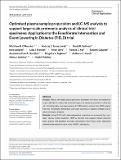Files in this item
Optimised plasma sample preparation and LC-MS analysis to support large-scale proteomic analysis of clinical trial specimens : application to the Fenofibrate Intervention and Event Lowering in Diabetes (FIELD) trial
Item metadata
| dc.contributor.author | O'Rourke, Matthew B. | |
| dc.contributor.author | Januszewski, Andrzej S. | |
| dc.contributor.author | Sullivan, David R. | |
| dc.contributor.author | Lengyel, Imre | |
| dc.contributor.author | Stewart, Alan J. | |
| dc.contributor.author | Arya, Swati | |
| dc.contributor.author | Ma, Ronald | |
| dc.contributor.author | Galande, Sanjeev | |
| dc.contributor.author | Hardikar, Anandwardhan A. | |
| dc.contributor.author | Joglekar, Mugdha V. | |
| dc.contributor.author | Keech, Anthony C. | |
| dc.contributor.author | Jenkins, Alicia J. | |
| dc.contributor.author | Molloy, Mark P. | |
| dc.date.accessioned | 2023-03-23T12:30:07Z | |
| dc.date.available | 2023-03-23T12:30:07Z | |
| dc.date.issued | 2023-05-16 | |
| dc.identifier | 283550981 | |
| dc.identifier | f01f5225-d757-459e-a2c3-55e8dedad716 | |
| dc.identifier | 85150893753 | |
| dc.identifier.citation | O'Rourke , M B , Januszewski , A S , Sullivan , D R , Lengyel , I , Stewart , A J , Arya , S , Ma , R , Galande , S , Hardikar , A A , Joglekar , M V , Keech , A C , Jenkins , A J & Molloy , M P 2023 , ' Optimised plasma sample preparation and LC-MS analysis to support large-scale proteomic analysis of clinical trial specimens : application to the Fenofibrate Intervention and Event Lowering in Diabetes (FIELD) trial ' , Proteomics - Clinical Applications , vol. 17 , no. 3 , 2200106 . https://doi.org/10.1002/prca.202200106 | en |
| dc.identifier.issn | 1862-8346 | |
| dc.identifier.other | ORCID: /0000-0001-7978-9507/work/132763903 | |
| dc.identifier.other | ORCID: /0000-0003-4580-1840/work/132764481 | |
| dc.identifier.uri | https://hdl.handle.net/10023/27246 | |
| dc.description | Funding: This work was performed by funding from The University of Sydney (CIA Jenkins) and funds provided by the National Health and Medical Research Council (Australia) APP1147897. | en |
| dc.description.abstract | Purpose: Robust, affordable plasma proteomic biomarker workflows are needed for large-scale clinical studies. We evaluated aspects of sample preparation to allow LC-MS analysis of more than 1500 samples from the Fenofibrate Intervention and Event Lowering in Diabetes (FIELD) trial of adults with type 2 diabetes. Methods: Using LC-MS with data-independent acquisition we evaluated four variables: plasma protein depletion, EDTA or citrated anti-coagulant blood collection tubes, plasma lipid depletion strategies and plasma freeze-thaw cycles. Optimised methods were applied in a pilot study of FIELD participants. Results: LC-MS of undepleted plasma conducted over a 45 min gradient yielded 172 proteins after excluding immunoglobulin isoforms. Cibachrome-blue-based depletion yielded additional proteins but with cost and time expenses, while immunodepleting albumin and IgG provided few additional identifications. Only minor variations were associated with blood collection tube type, delipidation methods and freeze-thaw cycles. From 65 batches involving over 1500 injections, the median intra-batch quantitative differences in the top 100 proteins of the plasma external standard was less than 2%. Fenofibrate altered seven plasma proteins. Conclusions and Clinical Relevance: A robust plasma handling and LC-MS proteomics workflow for abundant plasma proteins has been developed for large-scale biomarker studies that balances proteomic depth with time and resource costs. | |
| dc.format.extent | 10 | |
| dc.format.extent | 744083 | |
| dc.language.iso | eng | |
| dc.relation.ispartof | Proteomics - Clinical Applications | en |
| dc.subject | Plasma | en |
| dc.subject | Mass spectrometry | en |
| dc.subject | Proteomics | en |
| dc.subject | Biomarker | en |
| dc.subject | Diabetes | en |
| dc.subject | Fenofibrate | en |
| dc.subject | RC Internal medicine | en |
| dc.subject | QH301 Biology | en |
| dc.subject | ATC-NDAS | en |
| dc.subject | SDG 3 - Good Health and Well-being | en |
| dc.subject | MCC | en |
| dc.subject.lcc | RC | en |
| dc.subject.lcc | QH301 | en |
| dc.title | Optimised plasma sample preparation and LC-MS analysis to support large-scale proteomic analysis of clinical trial specimens : application to the Fenofibrate Intervention and Event Lowering in Diabetes (FIELD) trial | en |
| dc.type | Journal article | en |
| dc.contributor.institution | University of St Andrews. School of Medicine | en |
| dc.contributor.institution | University of St Andrews. Sir James Mackenzie Institute for Early Diagnosis | en |
| dc.contributor.institution | University of St Andrews. Institute of Behavioural and Neural Sciences | en |
| dc.contributor.institution | University of St Andrews. Biomedical Sciences Research Complex | en |
| dc.contributor.institution | University of St Andrews. Cellular Medicine Division | en |
| dc.contributor.institution | University of St Andrews. University of St Andrews | en |
| dc.identifier.doi | 10.1002/prca.202200106 | |
| dc.description.status | Peer reviewed | en |
This item appears in the following Collection(s)
Items in the St Andrews Research Repository are protected by copyright, with all rights reserved, unless otherwise indicated.

